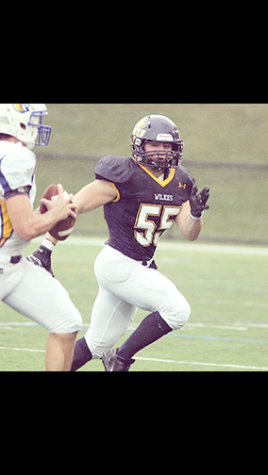To stay or not to stay: Discussions with student-athletes
Being a student-athlete can be challenging.
Some student-athletes may experience time management issues; some may feel under appreciated and some others may be unable to focus on classes.
There are personality conflicts with teammates and disagreements with coaches.
Some student-athletes may even lose their love for the game.
Many student-athletes come to college eager to continue the sport they were passionate about for their whole lives. Although that is true, it is unrealistic to think that every student who comes in as an athlete will graduate as one.
Many athletes report losing their passion for the game while playing at the collegiate level.
“I stopped playing sports when I realized I didn’t love it anymore. It was no longer fun; it was a chore,” said junior Devon Kriebel, who played 2½ seasons of Wilkes field hockey.
Tim Linder, who stopped playing football after two seasons, agreed with Kriebel’s first statement.
“I discontinued with my participation in the sport largely due to the loss of passion I had initially had when I first started,” Linder said. “This game that I had once found exciting and was enthusiastic about participating in became a burden for me and wasn’t something I looked forward to spending my time with.”
He decided to put more emphasis on his education after there were some staff changes that he did not believe were the right fit for him. He did, however, say that in the end, he made the better decision.
Former football player Nate Hughes cited similar reasons for leaving.
“One reason was simply because of a coaching change,” he explained. “Another reason was that I felt it was time to move on to things that would help me in the future and let go of something that I wasn’t getting anything positive out of. It became more like a job rather than something I looked forward to doing.”
Michael Condrad also had experience with leaving the football team after 1½ years due to the coaching change.
“The style of coaching switched up a little bit. No disrespect to Coach Brown; I think he is a very, very good man. However, his style of play and my style of play were a little too different for me to want to continue playing here,” he explained.
Coach Trey Brown had “no comment,” in regard to students choosing to leave the football team.
During his time on the football team, Condrad’s favorite thing about playing was when he first came to Wilkes because of the intensity of (former) Coach Frank Sheptock.
“He reminded me of my high school coach, very intense and a lot of passion and emotion went into the game,” Condrad explained.
Michael Fitz, a current junior football player, appreciates Brown’s coaching, even if he does not always agree with him.
“I think Coach Brown’s method of coaching puts the best men on the field,” Fitz said. “He’s not afraid to take risks. Don’t get me wrong, there are some things he does which I don’t agree with, but I still put my trust in him.”
Although the students no longer play for the school, most would still recommend playing sports to others.
“I would recommend this sport to others but make sure your goals match those of the program because it is a team sport that requires a lot of time and dedication,” Hughes said.
Linder agreed that he would recommend this sport to others. He emphasized that participating in a sport was a great way to make new friends. Coming in as a freshman, he said there was a comfort factor with upperclassmen being able to give him advice while he was trying to feel his first year of college out.
“I made some of my closest friends through the sport and I would go back and do it all over again if I could,” he said.
“Nothing lasts forever,” Linder said in regard to advising incoming students to imagine going to a school wherever they decide, with the possibility of not playing their sport anymore. He suggests that before committing to a program they should make sure that their philosophy is cohesive with that of the coaches for a strong fit.
Fitz explained that his favorite thing about being on the team currently, is building camaraderie, not just on the field but off the field as well. He went on to say that whenever he is in a situation, he knows that he has all of his teammates behind him.
“We’re a family,” he said.
Fitz admited that there have been days where he thought about not playing anymore because of frustration.
“Ultimately I couldn’t give up because I knew I wasn’t the only one on the team feeling this frustration,” he continued. “…The transition from high school football to college football was one I was just thrown into.
“It was hard. Some aren’t cut out to make that transition.”
Field Hockey Coach Sara Myers had no comment about players quitting the team.
Although Kriebel had a bad experience with the field hockey team, this past year, seven Wilkes field hockey players were named to NFHCA Division III Academic Squad.
Similarly, nine football players were named to ALL-MAC football teams.

Kim Hein is a senior Communication Studies major with triple concentrations in Strategic Communication/PR, Rhetorical Studies and Broadcast Production....